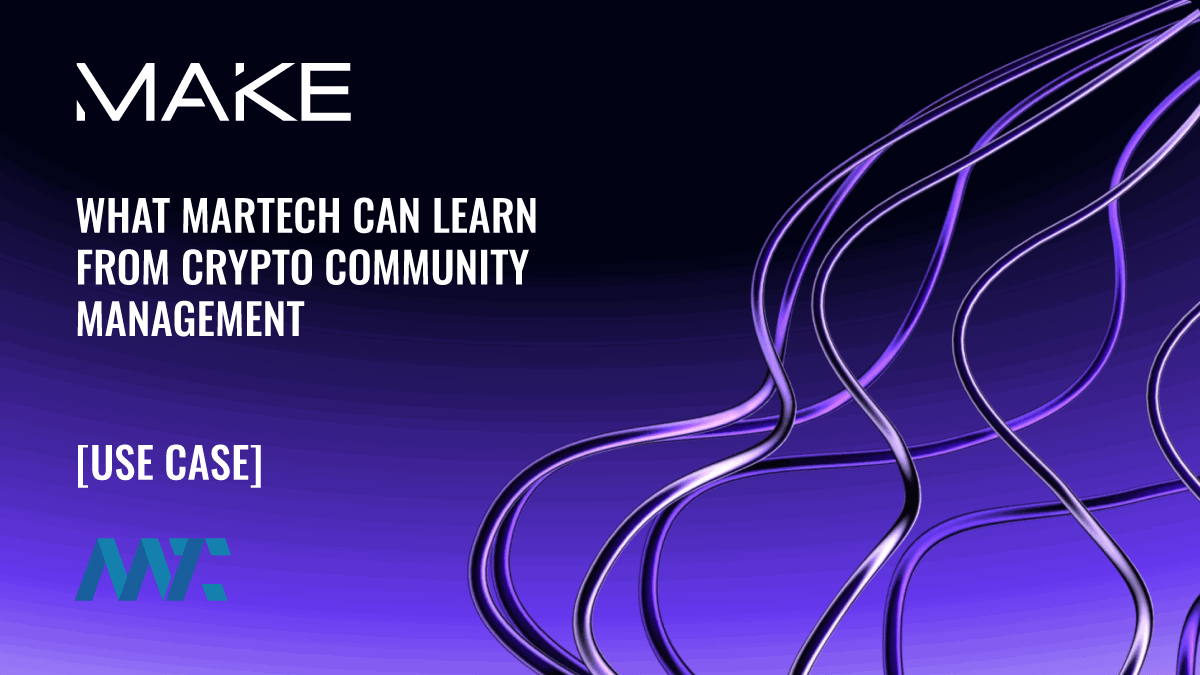What Martech Can Learn from Crypto Community Management
Web3 projects aren’t just building products—they’re building tribes. These decentralized, often anonymous communities are core to the success or failure of any blockchain initiative, yet they operate outside traditional customer engagement playbooks.
For Martech professionals, crypto community management offers a compelling glimpse into the future of brand interaction, loyalty-building, and engagement at scale. Unlike conventional customer journeys, crypto communities are born on Telegram, nurtured on Discord, and galvanized by token-based incentives. These channels are fast-moving, open 24/7, and hyperreactive to even the slightest change in roadmap or sentiment.
Successfully managing them requires more than social media tools or CRM integration—it requires a rethinking of marketing infrastructure altogether. The global cryptocurrency market cap today is $3.68 Trillion, a 0.48% change in the last 24 hours and 64.63% change one year ago.
Understanding Crypto
Cryptocurrency, broadly speaking, refers to digital assets secured by cryptographic protocols, often running on decentralized blockchain networks. Bitcoin may be the most famous, but the ecosystem has expanded into thousands of projects across DeFi (Decentralized Finance), NFTs (Non-Fungible Tokens), DAOs (Decentralized Autonomous Organizations), and more recently, Web3 infrastructure and AI integrations.
These initiatives aren’t limited to financial speculation; many aim to redefine how people vote, own, trade, create, and interact online. From decentralized social networks to blockchain-based identity systems, the scope of crypto’s potential disruption is massive.
The Challenges of Crypto
Yet, with this growth comes an uphill battle for legitimacy. The crypto space is plagued by misinformation, scams, rug pulls, and regulatory uncertainty. Inconsistent terminology, opaque whitepapers, overhyped roadmaps, and sudden disappearances of project founders contribute to an atmosphere of skepticism.
Trust is not easily won in crypto. Unlike traditional industries where regulatory bodies, product warranties, and brand heritage offer safety nets, crypto communities often operate in gray areas with no formal customer support, no refunds, and little legal recourse.
The Importance of Community Management
As a result, trust must be earned through transparent communication, real-time responsiveness, and the visible activity of core contributors. This is where community management becomes not just a tactical necessity, but a strategic pillar.
Why Community Matters in Crypto Marketing
According to MAKE Agency, there are now over 10,000 active crypto projects competing for attention. In such a fragmented landscape, centralized advertising alone cannot sustain interest or trust. The brands that succeed are the ones that cultivate self-sustaining ecosystems of advocates, builders, and believers.
A New Approach
MAKE treats community management not as an add-on service, but as a foundational pillar alongside influencer campaigns, growth hacking, and PR. Their approach reflects an evolution of the Martech stack, where community data isn’t siloed—it’s central.
Their community managers are on the frontlines 24/7, engaging in technical discussions, diffusing FUD (Fear, Uncertainty, and Doubt), and guiding users through every stage of adoption. Crypto isn’t just a product category; it’s a technical revolution.
Education Before Conversion
Explaining proof-of-stake consensus, smart contract audits, gas fees, tokenomics, or staking mechanisms to a general audience is no easy feat. Most consumers—and even most marketers—lack the technical literacy to grasp these concepts intuitively.
Traditional marketing channels and content formats are not built to handle this complexity. A Facebook ad or Instagram story isn’t the ideal medium for explaining the subtleties of zero-knowledge proofs or liquidity pools. Crypto requires education before conversion.
The Role of Community Platforms
Community platforms like Discord, Telegram, and Reddit offer real-time, contextual discussion threads where users can ask questions, share experiences, and validate each other’s understanding.
Community managers often serve as both translators and trust brokers, bridging the gap between technical teams and end users. Traditional Martech tools often struggle to keep pace with real-time communities.
The Demand for Community Intelligence Tools
Discord doesn’t support native CRM integration. Telegram offers little in the way of user tracking or analytics. Yet this is where users spend most of their time—and where sentiment can shift by the hour.
Crypto marketing teams have adapted by layering purpose-built community intelligence tools on top of these platforms.
The Passion of the Crypto Community
Perhaps the most unique aspect of crypto communities is their passion. Unlike transactional customers, crypto users often view themselves as stakeholders in a mission.
They will defend a protocol in debates, educate newcomers, and volunteer their time to contribute to ecosystem development. A sense of ownership fuels this passion—sometimes literally, as in the case of token-holders who benefit from a project’s success.
The Double-Edged Sword of Passion
Community sentiment can become a powerful tailwind, propelling organic marketing, influencer advocacy, and viral amplification. However, passion is a double-edged sword.
Communities can turn quickly if they feel misled, ignored, or undervalued. The same people who once amplified your message can just as quickly organize around your failure.
Martech Implications
In crypto, community trust is earned slowly and lost in an instant. Martech platforms that treat user engagement solely as post-purchase support are missing a broader opportunity.
Real-Time Visibility and Moderation are Non-Negotiable Waiting 24 hours for a dashboard refresh won’t cut it when thousands of users are reacting to an influencer’s tweet or project listing in minutes.
A New Era of Community Management
Crypto community management isn’t a fringe marketing discipline—it’s a preview of what the future demands from modern Martech. As trust erodes in traditional institutions and decentralized models gain traction, marketing success will hinge on a brand’s ability to cultivate community, foster transparency, and respond with agility.
